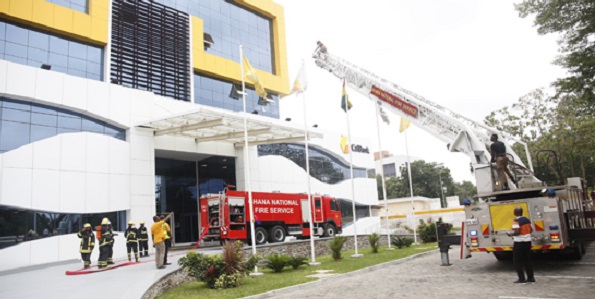The fire and emergency alarm of the CalBank Head Office in Accra went off in the early hours of last Thursday, with fire and smoke appearing to rage through the top floor of the head office on the Independence Avenue.
Distracting work activities on the whole premises, the incident saw both staff and customers orderly making their way out of the 12-storey building to safety, while ensuring that there was no individual left in the building.
About three minutes into the incident, a fire tender and an ambulance arrived at the premises to quench the fire and ensure that affected individuals were properly taken care of.
It was after this that the Chief Risk Officer of CalBank, Barbara Banson, announced to the staff and customers that it was a mock fire safety drill after they had gathered at the assembling point.
The safety drill was a partnership with the Ghana National Fires Service (GNFS).
Simulation
Mrs Banson explained that the exercise was part of the yearly activities of the bank to periodically test and strengthen the resilience of the bank to fire outbreaks while ensuring that staff and customers were protected.
“Hence, as part of our business continuity plans, it is imperative that we continuously educate our staff on fire protocols and procedures to enable them respond effectively in the event of a fire,” she said.
She expressed excitement at the response of the staff and customers to the emergency alarm, with staff marshals successfully evacuating individuals to assembly points and conducting head counts immediately to ensure that all staff and customers were accounted for.
Mrs Banson, however, indicated that the smoke was an artificial one, while the GNFS released hydraulic ladders to evacuate staff from the higher floors.
The fire protection protocol, she said, had been rolled out to take place in the bank’s 30 branches nationwide.
Response
The District Commander of the Ministries Fire Station, DCO1 Faustina Nelson Asiedu, commended the bank for its swift response to the emergency alarm.
She said within three minutes of the sound of the alarm, all staff and customers had made their way out of the premises.
DCO1 Asiedu explained that as a public facility, routine fire drill was important for testing the efficiency and preparedness of the bank’s safety systems to manage emergencies like fires with checks of their available equipment.
She applauded the institution for having all equipment needed to fight fire such as the hydrants, reels, among others, saying those were very necessary for an effective fire douse even without the presence of fire tenders.
DCO1 Asiedu, however, entreated other corporate institutions to adopt such programmes to train and inculcate in their staff fire safety evacuation procedures.

